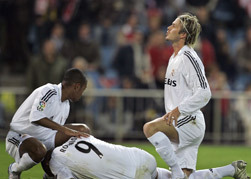
Real Madrid have moved ahead of Manchester United to become the world’s richest football club in terms of income, according to the latest Deloitte Football Money League report.
After eight years at the top of the list, United were pushed into second place based on revenues from the 2004-5 season.
Real Madrid’s income has doubled in the past five years, as their policy of recruiting Galatacticos reaped dividends off the pitch.
The list was dominated by English and Italian clubs with eight British clubs and five from Italy among world’s richest 20 teams.
The Deloitte review concentrates solely on day-to-day income from football business such as ticket sales, merchandising and broadcast revenues.
Manchester United lost their position as the world’s richest club in income terms with the club’s income falling to £166.4m from £171.5m the year before, due mainly to reduced broadcasting revenues both at home and in Europe.
Deloitte said Manchester United was unlikely to reclaim top spot this year because of its early exit from this season’s Champions League.
But it said it could return to the top in the near future especially as it was further increasing the capacity of its Old Trafford ground.
“United remain one of the foremost brands in the industry and are still clearly the most profitable club in terms of day-to-day operations,” said Dan Jones, partner at Deloitte’s business sports group.
But he added: “The club will want to improve its performance on the pitch to help management’s efforts to increase commercial value.”
Real Madrid’s commercial domination has come despite mixed fortunes on the pitch in recent years. The club, with only one Spanish title in the last four years, doubled their revenues from £93.2m per annum in 2001 to £186.4m at the end of the financial year in 2005.
However, the appeal of star players such as David Beckham have helped boost the club’s merchandising efforts.
“Real Madrid have been more successful in turning their international support into revenues than most other clubs including Manchester United,” Deloitte’s Paul Rawnsley said.
“Although president Florentino Perez’s strategy of recruiting world-class galactico players has not necessarily delivered the anticipated on-pitch results recently, their presence has facilitated a transformation in the club’s financial performance.”
Deloitte’s report indicates that there are lessons to be learned from Real Madrid’s progress.
“The mainstay of Real’s revenue growth is not match-day revenues, as we have seen in many of the UK clubs, or broadcasting revenue, as we continue to see in Italy, but strong progress in realising their commercial potential,” it said.
“Real have concentrated on improving commercial revenue in terms of developing [an] extensive partner programme and in turning the club’s strong international support into revenue for the club.”
Chelsea, Liverpool, Arsenal, Newcastle United, Tottenham Hotspur, Manchester City and Everton are the other British clubs to make it into the top 20.
Everton made it into the list for the first time after finishing fourth in the English Premiership last season.
The combined income of the top twenty clubs surpassed £2bn for the first time in 2004-5.
Top 20
1(2) Real Madrid £186.2m
2(1) Man Utd £166.4m
3(3) AC Milan £158m
4(5) Juventus £154.9m
5(4) Chelsea £149.1m
6(7) Barcelona £140.4m
7(9) Bayern Munich £128m
8(10) Liverpool £122.4m
9(8) Inter Milan £119.7m
10(6) Arsenal £115.7m
11(12) Roma £89m
12(11) Newcastle £87.1m
13(14) Spurs £70.6m
14(17) Schalke £65.8m
15(-) Lyon £62.7m
16(13) Celtic £62.6m
17(16) Man City £60.9m
18(-) Everton £60m
19(-) Valencia £57.2m
20(15) Lazio £56.1m
Subscribe to World Soccer – The essential football magazine






